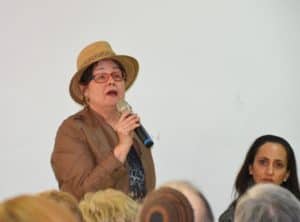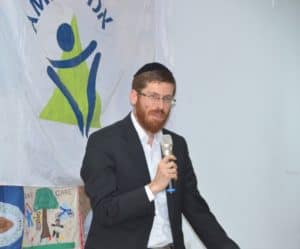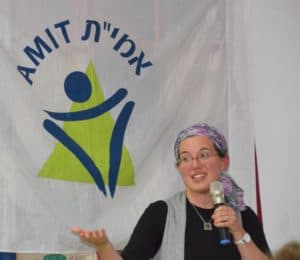This article appeared in the “In Jerusalem” supplement of the Jerusalem Post on June 10, 2016. Reprinted with permission.
From ‘Pasuk’ to ‘Pilpul’ to ‘Pesak’: The Evolution of Women’s Leadership in Orthodoxy
By Hannah Katsman
Discrepancies between men’s and women’s education disturbed Rabbanit Malke Bina during her studies at Michlalah College for Women in Jerusalem, where only one out of her 28 teachers was female. She also missed the traditional beit midrash, or study hall, where men in yeshiva engaged in the traditional back-and-forth questioning and argument known as pilpul.
“In Michlalah’s library, you couldn’t speak above a whisper,” said Bina.
While she valued the intensive Bible studies at Michlalah, she realized that true depth and breadth in Jewish learning required the study of the Talmud.
Bina, along with three other experts in Jewish education, spoke on “Evolution of the Role of Women in the Orthodox Community,” the topic of AMIT’s annual symposium in Jerusalem on May 25. Panelists examined women’s leadership in Orthodoxy from a historical, theological and practical perspective.
Symposium chair Aviva Pinchuk opened the proceedings to a packed hall of more than 100.
“Women today are seeking official recognition for their Torah and talmudic scholarship,” she said. “They want to be seen as leaders in their community. While many Orthodox rabbis and laypeople support this, others fear a slippery slope. Is Halacha able to accommodate these changes?” AMIT, based in the US, raises funds to support educational and social projects throughout Israel, including a network of schools and children’s homes.
“AMIT schools are at the cutting edge of education for Orthodox girls,” said Yaffi Shmidman, chair of the AMIT Israel Executive, “with Beit Shemesh’s AMIT Noga as the first girls’ high school to offer a five-point matriculation exam in Talmud.”
Bina, founder, chancellor and director of MATAN, discussed her evolution from a Bais Yaakov student in Baltimore to a leader in women’s higher Jewish education, notably Talmud study. She summarized the evolution of women’s Jewish studies as a progression from pasuk to pilpul to psak.
Pasuk (verse) refers to the Bible study universal among Orthodox institutions for women and girls. Bina revolutionized the study of Talmud for women by placing the beit midrash in the center of its building.
“Psak,” continued Bina, referring to rulings on matters of Jewish law, “is the next stage, where women take on leadership roles and get involved in decision-making.”
Rabbanit Dr. Ayelet Libson, Lady Davis postdoctoral fellow at the Hebrew University and member of the Beit Hillel rabbinic forum, addressed the unique challenges for Orthodox women seeking communal careers. Men follow a known career path and have a natural support group of fellow yeshiva students. The three five-year graduate programs in Jewish law at MATAN, Midreshet Lindenbaum and Beit Morasha now provide women with a similar group of peers.
Libson mentioned Nishmat’s pioneering program for yoatzot halacha (advisers in Jewish law), which trained women in the laws surrounding laws of Jewish ritual purity.
“Nishmat emphasized over and over that the women were not poskot [arbiters of Jewish law],” said Libson, “and that only a male rabbi could make the final ruling. This was very wise for that time and the secret of their acceptance.”
According to Libson, Jewish community leaders have been experts in the Talmud and Jewish law but not other fields such as Jewish liturgy or philosophy.
“Women began to realize that if they wanted influence and leadership roles, Halacha is essential,” she explained.
This understanding spurred the formation of the new programs.
Other issues include curricula denying girls the basics of talmudic study from a young age, lack of female role models and career structures that don’t easily accommodate motherhood.
Libson also addressed the inherent contradiction faced by Orthodox women seeking leadership roles.
“Women who are in Orthodoxy because they value tradition have to contend with being trailblazers and rule-breakers against their will,” she said.
To counter this, Libson urged women to write and speak.
“Writing is an excellent way to get to think a topic through in depth. Publishing is another way to show expertise on a topic, without having to wait to be asked,” she said.
Women are often afraid to speak up because they feel unqualified.
“But expertise can only develop in the role,” insisted Libson.
She concluded her talk with suggestions for the future of Talmudic study, as much of what rabbis traditionally studied is no longer relevant.
“Today, knowledge is much more available. Laypeople know a lot more, so you can just ask ‘Rabbi Google,’” she stated. “We need to rethink the role of the rabbi – is it to get an answer or should there be more emphasis on the pastoral role? Instead of being so focused on knowledge, rabbis should also be able to have a halachic conversation with laypeople and constituents.”
Rabbi Yehoshua Pfeffer provided a conceptual understanding of how change in Jewish practice occurs alongside changes in society, speaking on “Torah and Feminism: Can the Two Go Together?” Introduced as the panel’s “token male,” Pfeffer heads the Haredi section of the Tikvah Fund in Israel, teaches as Yeshivat Hedvat HaTorah – a yeshiva that is part of the Amit network – and previously served as a law clerk at the Israeli Supreme Court.
“Sarah Schenirer wasn’t a radical,” asserted Pfeffer, referring to the founder of the Bais Yaakov system in 1917. “She reacted to a dynamic need, as we see in her tragic description of women being left outside the synagogue and standing by the wayside regarding everything Jewish. We must provide Jewish girls with learning experiences that will sustain them so that they don’t fall by the wayside. This might be feminism, but of a type less aware or conscious than the familiar feminism of today.”
The Torah’s attitude toward slavery, like that toward women, raises moral issues by modern standards. The Torah accepts slavery as reality.
“Does that mean we should consider the abolition of slavery as something that runs counter to the Torah?” Pfeffer asked, “or is it following on in the spirit of the Torah? The Torah clearly and emphatically improved the conditions of slaves. The Torah didn’t mean to revolutionize it in an instant.”
“It’s hard to put ourselves in the place of women thousands of years ago,” Pfeffer continued. “Protecting women against the barbaric practices that we still see today in other cultures, like a man taking a woman he had raped under his protection, was a huge development.”
Long after the biblical and talmudic eras, rabbis in France/Germany instituted further protections for women such as banning both polygamy and divorce without the wife’s consent. By the late 1500s, a legal mechanism allowing a man to bequeath wealth to his daughter was codified in glosses to the Code of Jewish Law by rabbinic authorities such as the Rema.
“So is the Rema doing something that is against the Torah?” asked Pfeffer. “Though using a halachic mechanism, it seems to run against the Torah – but of course this is not the case.”
Citing the work of Ronald Dworkin, an expert on legal systems, Pfeffer compared the halachic system to a book with a new chapter written in each generation. The writers of each chapter – meaning those who answer new questions that arise – first examine the system as a coherent whole. They then fit any new rulings into the system, thus maintaining the halachic integrity of Judaism from chapter to chapter.
“How big can we allow the gap to be between chapters, between one generation and another?” Pfeffer challenged. “It’s rhetoric to say there is no gap, as there are always new questions. [But] we avoid jumps and leaps. The idea is to proceed harmoniously from one generation to the next.”
“The haredi world tries to minimize the gap,” continued Pfeffer.
“But the need for haredi women to be breadwinners has empowered women to a degree that was hitherto hard to find. More women are willing to express opinions, and small groups are even starting to study Talmud. Within a few years, they will probably be out in the open. Change happens, but slowly.”
The final panelist, Dr. Jennie Rosenfeld, spoke on “What Is a Manhiga Ruchanit? Lessons Learned in My First Year on the Job.”
Rabbi Shlomo Riskin, the chief rabbi of Efrat, appointed Rosenfeld as a spiritual leader. Like the other speakers, Rosenfeld mentioned the importance of gradual change.
“Rabbi Riskin wants things to develop organically, with female leadership gradually evolving, not a radical break,” she said.
Rosenfeld has a PhD in English literature and graduated from Yeshiva University’s Graduate Program in Advanced Talmudic Study. Author of Et Le’ehov: The Newlywed’s Guide to Physical Intimacy, she is studying for an advanced degree in Talmud at Midreshet Lindenbaum.
In her talk, Rosenfeld denied any inherent differences between men’s and women’s leadership.
“Women should bring empathy and compassion to their work, but it doesn’t mean it wasn’t there before… The main value is giving people more opportunities and points of entry,” she said.
In her position, Rosenfeld fields questions from men, women and couples about all areas of Jewish law.
“Some questions are more traditionally female,” she said, “like the permissibility of permanent makeup, a beauty procedure I hadn’t encountered before. The women might not have felt comfortable asking a male rabbi. Some questions don’t require specialized training, but people prefer consulting someone with Torah knowledge.”
Like Libson, Rosenfeld addressed the lack of career opportunities for women who completed programs and passed exams equivalent to or more difficult than those of male rabbinic graduates.
While graduates of the Maharat program in the US have found jobs as assistant rabbis, few congregations in Israel have even one full-time female rabbi. She suggested that women take rabbinic positions funded by the government as rabbis of cities, schools, prisons and within the army.
“Many positions are held by people not doing their job, functionaries with protektzia,” said Rosenfeld. “Perhaps we could change the system from the inside, using resources already there to give these positions new meaning and open them to women as well.”
She noted that many in the Orthodox community have a visceral reaction to the concept of a woman rabbi, and this needs to be respected.
“Rabbi Yitz Greenberg said you need to be 5 to 10 percent ahead of the community you are trying to lead. If you are further than that, you leave everyone behind,” she said.
Devorah Meyers of Connecticut, a graduate of SAR in Riverdale, attended the symposium with classmates from the Midreshet AMIT seminary.
Speaking with In Jerusalem, Meyers said, “I am so privileged to learn Torah in the same way that boys my age are learning in yeshivot… I would love to be involved in the community and have a leadership role. My community has given me so much, and it would make me so happy if I could give back.”
Another attendee, Tzvi Atik, a resident of Queens, New York, who lives part of the year in Israel, addressed the differences between Israel and the US. “The success rate of Maharat graduates is leading to polarization in the US, with antagonism toward open Orthodoxy,” said Atik. “In Israel, things are moving more slowly and having more success.”





The antagonizing towards Open Orthodoxy isn’t simply because of the speech of the changes they are implementing.
Their number one “posek” doesn’t believe in Torah MiSinai.
One of their most popular rabbis believes that homosexual marriages should be permitted by Jewish law. Another openly writes about turning Israel into a bi-national state where Islam is equally as important as Judaism. He also muses about changing prayers in the siddur to make it more “inclusive” a la secular liberal values. Their leader has invited Chrisian groups to sing in his synagogue and yeshiva.
The underlying reason for many of these changes advocated by OO is their desire to minimize or eliminated the Torah-based system of differences between genders in terms of public and family participation and roles.
The fear from the right is that what starts with a little breach will end up as a huge hole. It’s one thing if a woman, completely committed to halacha, begins learning and even if she reaches the level of giving p’sak but the fear is that she will then turn around and say “And I think that just as men don’t have to cover all their hair neither should woman!” and “Just as they can do ‘x’ in shul so should women!”
“It’s one thing if a woman, completely committed to halacha, begins learning and even if she reaches the level of giving p’sak but the fear is that she will then turn around and say “And I think that just as men don’t have to cover all their hair neither should woman!” and “Just as they can do ‘x’ in shul so should women!””
Why isn’t there the same concern about teaching and ordaining men?
That question doesn’t make an sense to me. What is the concern with men that is unique to them? GI picked an example of a restriction on women that does not exist for men. Is there a restriction on men that does not exist for women? In the 1500+ years of male Rabbis, has there been a concerted effort to overturn such restrictions?
We ordain any man who is capable, even though he might turn around and make some ruling that you don’t agree with.
There’s a further consideration. What does the title “Rabbi” mean today? It carries no official authority. If a Rav walks into the room and shouts “jump” you don’t have to do so. At the base, a rabbi is simply someone who has completed an area of study in halacha and is now qualified to answer questions in that area. If there are communities where rabbonim are treated like infallible demigods whose every word must be obeyed we must realize that this is because the community in question has chosen to grant them this authority, not because it’s intrinsic in the title.
Therefore a yoetzet who has learned to the same level as a man in the laws of niddah is just as authorized to answer a question in hilchos Niddah. There is nothing to stop women from learning the laws of kashrus, Shabbos, or even financial and civil laws and answering questions once they have demonstrated competence in those areas. The issue is whether or not a woman can have an authoritative role in a community but that has little to do with the title “Rabbi” if you really push it.
So to sum up the title doesn’t really mean anything, but it would be disastrous if women had it.
Off the top of my head I can’t think of something simple that a man is forbidden to do but which is permitted to women. However one could approach the idea differently. For example, women are exempt from positive time-bound commandments. Therefore one could argue that there are far more obligations and restrictions on how men serve God than with women who have more freedom and flexibility in their service of the Divine.
Furthermore, within the men’s section there are division. A non-Kohen cannot do birkas Kohanim, cannot do a first born redemption or get the first aliyah to the Torah if there is a Kohen in the room. I can want to be a Kohen as much as I can but by birth that role in the nation is closed to me. No rabbonim are, to my knowledge, doing anything about that.
The final point, that a man might turn around and make a disagreeable ruling, is not a compelling counter-argument for me. I restricted my original comment to Open Orthodoxy for a reason. Most of their male candidates are questionable when it comes to their psak in halachic matters. By adding the women in their community to the mix you know create a situation where you have a group of men AND women doing unorthodox things while calling themselves Orthodox. Hardly a move that would encourage more committed Orthodox communities to consider increasing the public roles of women
So you’re against it because you assume that too many of the women seeking it are “Open Orthodox” and you’d rather limit their number.
Thanks for sharing .This issue reminds me of the campaign to allow girls to become pilots. It relates to a few elite women and ignores the real issues that help women become more spiritual and more observant. Responsibility is taken not given. Rabbanit Yemina Mizrahi has more influence than most Rabbis would dream of having. Leadership comes from who you are and what you do , not the title and position you have. From my experience women who are concerned with the ma’amad ha’halacha in the eyes of women are less interested with ma’amad ha’isha in the eyes of the halacha. In the past women took responsibility , now they want to be given responsibility.